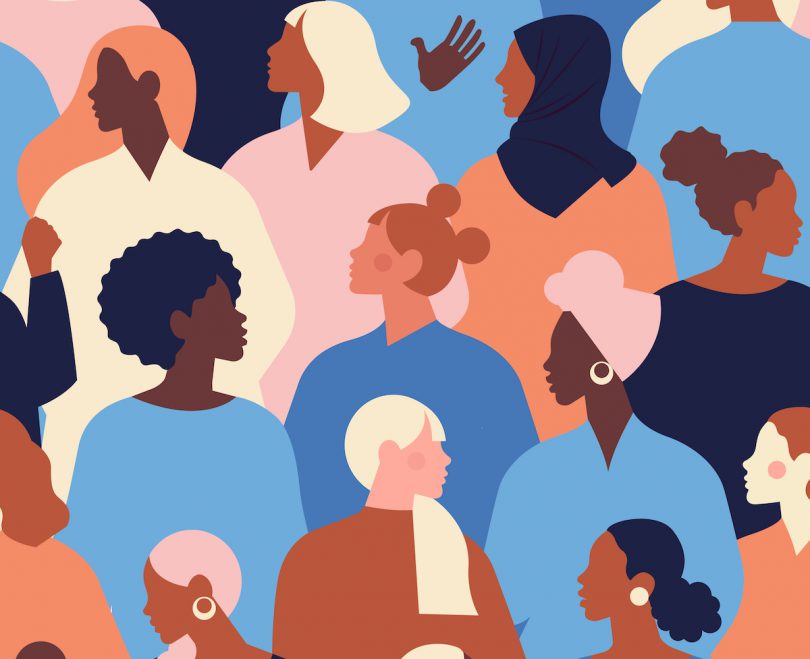The PRSA Diversity & Inclusion Committee spoke with Nathalie Santa Maria, APR, owner and chief communications officer at Sunnyside Communications, to discuss how diversity, equity and inclusion (DE&I) work is impacting women in public relations and potentially opening more doors for honest dialogue.
Santa Maria, who holds a Master of Science in Family, Youth and Community Sciences from the University of Florida, also serves as the executive director for Leaves from Stella, a nonprofit she founded in honor of her late mother, Estela, that provides scholarships and a pen-friends program for young adults who have lost a parent or sibling. She is also a Big Sister for Big Brothers Big Sisters of the Central Carolinas and a PRSSA PRoud Mentor.

Why is DE&I integral to the work you do?
Understanding how different parts of my identity left me out of conversations and scenarios helps me understand the necessity for diverse voices at the table. In essence, it comes back to the basis of intersectionality: a theoretical framework for understanding how aspects of a person’s social and political identities combine to create unique modes of discrimination or privilege.
My ethnicity as a Cuban American, my acute anxiety mental health diagnosis, my gender, growing up one paycheck away from potentially losing our home, being a first-generation scholar and being orphaned at 23 years old influences how I work.
While stories like mine are abundant, we do not talk about them openly or as often as we should. Making an effort to understand the advantages and disadvantages that people feel due to a combination of intersectional factors when writing messages for different audiences is a skill I focus on, trying to continue to learn as I go.
What challenges did you face when first entering PR and marketing?
I had a career identity crisis before I even started! I graduated from college at the start of the great recession in 2008; finding a job was tough. Also, my parents were critically ill, and I realized that my dream of being a public information officer for the county/national hurricane center would be detrimental to my mental health.
I also felt the push and pull of living a hyphenated ethnicity: Am I too American for my Cuban family, or am I too Cubanita for my non-Hispanic friends and colleagues in the United States? And then the added guilt of knowing everything my parents sacrificed to immigrate here to give me and my sister better opportunities. Am I making them proud? Am I doing enough?
Over time, learning the value of introspection helped me understand the tensions within my own identity and how that could be an asset in my communications work.
What advice would you give younger women of color trying to break into the PR space? Do you think the increased push for diverse voices will provide more opportunities?
I sure hope so. There is something powerful and encouraging in representation. My advice to young women would be never to forget the value they bring to organizations and teams. Repeat it, embrace it and make it a mantra.
We often receive external messages about how we have to be more “this” or more “that” with a traditionally white, non-immigrant, and heterosexual benchmark. Consequently, we feel we have to dress a certain way or articulate ideas in a particular manner while trying not to come off as angry or emotional.
I would also add that while ambition is essential, beware of the hustle mentality and culture. Internalizing messages that we have to do more and make more leads to burnout and hurts our creativity.
Build and nurture your network over time, not overnight. Mentors and supervisors I’ve had over the years have helped me find new jobs are now even my clients. These people built the ladders that the people behind them can climb, and I aim to pay it forward by doing the same for others.
Have you seen any positive shifts in public relations — do you think the profession is more inclusive of women and marginalized people?
I have seen positive shifts, but we still have a long way to go. I think including more diverse voices is a great start, but we need to consider becoming more action-oriented. We need to consider if our discussions about race, disability, gender, sexual orientation, income disparities, health-care access and immigration status have a significant impact. How we talk and write about human experiences can lead directly to harm reduction.
Take the unpaid internships discussion in our industry, for example. Have we considered that this leaves out many people who do not have others providing for them? How do we change this expectation that people graduating must have a cumulative experience via free work to measure aptitude? If we are serious about DE&I, then we need to consider how we can make public relations a more accessible and equitable space.
DE&I should also not fall on one person or one department. Public relations and communications is one piece of DE&I that should be working alongside research and development teams, human resource teams and customer service teams to improve experiences and messages.
You can join Santa Maria and other PRSA experts for a presentation on May 13. Humanizing Communications: How to Create Thoughtful and Inclusive Narratives. The webinar is free for PRSA members.
Kristie Colón is a member of the PRSA Diversity & Inclusion Committee. She is the communications director of the College at the University of Kentucky. You can connect with her on LinkedIn.
[Illustration credit: angelina Bbambina]







Excellent! Love this piece…and the intersectionality of thoughts/comments on anxiety as well as race/identity and education. Really inspirational read…
Robin Robinson
Western Kentucky University
This article was empowering and refreshing to read. As a black woman planning to work in public relations it is important to have this conversation. Having people of different backgrounds, race, gender, religion and more should be discussed in appropriate ways. Having your workplace look like the world around you makes sense. To have discussions and make decisions for a company you should have diverse responses. I think it was great to give your background of what makes you different from others. Diversity is more than just race, and I believe that some people forget that. This article is great for recent graduates to read because it is honest and realistic. It is not sunshine and sparkles after you graduate. Life happens and we need to have these conversations to set realistic expectations.